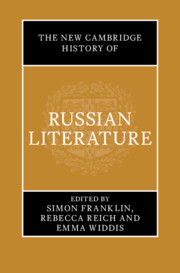Book contents
- The New Cambridge History of Russian Literature
- The New Cambridge History of Russian Literature
- Copyright page
- Contents
- Figures
- Contributors
- Acknowledgements
- On Transliteration, Names, and Dates
- Introduction
- History 1 Movements
- History 2 Mechanisms
- History 3 Forms
- History 4 Heroes
- 4.1 The Saint
- 4.2 The Ruler
- 4.3 The Lowly Civil Servant
- 4.4 The Peasant
- 4.5 The Intelligent
- 4.6 The Russian Woman
- 4.7 The New Person
- 4.8 The Non-Russian
- 4.9 The Madman
- 4.10 The Émigré
- Index
- References
4.7 - The New Person
from History 4 - Heroes
Published online by Cambridge University Press: 31 December 2024
- The New Cambridge History of Russian Literature
- The New Cambridge History of Russian Literature
- Copyright page
- Contents
- Figures
- Contributors
- Acknowledgements
- On Transliteration, Names, and Dates
- Introduction
- History 1 Movements
- History 2 Mechanisms
- History 3 Forms
- History 4 Heroes
- 4.1 The Saint
- 4.2 The Ruler
- 4.3 The Lowly Civil Servant
- 4.4 The Peasant
- 4.5 The Intelligent
- 4.6 The Russian Woman
- 4.7 The New Person
- 4.8 The Non-Russian
- 4.9 The Madman
- 4.10 The Émigré
- Index
- References
Summary
The Bolshevik Revolution of 1917 proclaimed its goal as the creation of ‘new people’: the transformation of human bodies and minds to correspond to the transformation of society. Literature became a space in which this new model of human life could be explored. This chapter traces the genealogy of the ‘new person’ from the nineteenth century to the figure of the ideal worker in Socialist Realist texts of the 1930s and beyond. The temporal focus of the chapter lies in the decade following 1917, when urgent but often contradictory political imperatives shaped the new person in literary texts. The chapter focusses on three key tensions: the relationship between the individual and collective; competing ideals of spontaneous energy and iron discipline; and the ideal of the transformation of body and mind. It shows how texts explore the relationship between abstract ideals of humanness and their lived reality.
Keywords
- Type
- Chapter
- Information
- The New Cambridge History of Russian Literature , pp. 788 - 805Publisher: Cambridge University PressPrint publication year: 2024

